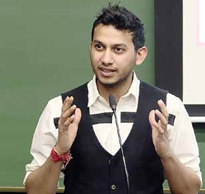
Azim Premji of Wipro, Shiv Nadar of HCL Technologies, and the founders of Infosys are some of the most cash-rich promoters in the country. The promoters of the three technology companies together earned a little over Rs.20,000 crore through equity dividends and share buybacks in the last three years. Share buybacks accounted for 56.5 per cent of their cash earnings during the period. Among individual promoters, Premji tops the list with cash earnings of Rs.10,115 crore, through equity dividends and share buybacks, in the last three years. Meanwhile, Wipro Group will expand its presence in Saudi Arabia through tie-ups with local companies. Wipro Technologies has entered into a memorandum of understanding (MoU) with the Ministry of Communication and IT of Saudi Arabia.“We have been working in that market for over 15 years. They are looking for the transformation of industry in areas like oil and gas, health care, education and that would require a whole lot of talent,” said Anand Padmanabhan, President, Strategic Sales and Geographies, Wipro. The company already has 1,200 IT professionals working in Saudi Arabia.“We will be in education and training. And, it is mutually beneficial since we will also require a lot of people in that geography for our operations,” he said.
Chairman and Managing Director of DHFL, Kapil Wadhwan, will now hold the additional responsibility of CEO until the housing finance company gets a strategic partner on board. Harshil Mehta, who was the Joint Managing Director and CEO of the company, resigned on February 13. However, the company informed the stock exchanges that he will continue as Executive President–Retail Business. “This decision is in alignment with DHFL’s plan of closing a strategic partnership deal in the next quarter which requires broad-basing and demarcating the Board of Directors from daily management,” DHFL said in a statement. The company also plans to induct Sunjoy Joshi as Independent Director and Srinath Sridharan as Non-Executive, Non-independent Director to its Board of Directors post regulatory clearances.

Commerce and Industry Minister Suresh Prabhu said the government is making a strategy to make India a $5 trillion economy and simultaneously fine-tuning the plan to take it to $10 trillion. Of the $5 trillion, services sector contribution is pegged at $3 trillion and equal contribution for manufacturing and agriculture at $1 trillion each. “Services cannot grow at the expense of agriculture and manufacturing. Services can provide jobs opportunities for which we have identified 12 champion sectors,” Prabhu said at The Economic Times Global Business Summit. “We have to focus on job creation and inclusive growth,” Prabhu added. Besides, India is also eyeing $100 billion of foreign direct investment (FDI) in the next two years. The sectors that received maximum FDI in 2018 include services, computer hardware and software, construction development, trading, automobile, pharmaceuticals, chemicals, and power.

Leading online payments service provider, Naspers-owned PayU, has a new Chief Executive for its Indian operations in Anirban Mukherjee, who will report to Laurent Le Moal, CEO, PayU Global. Besides leading PayU’s Indian business, Anirban will join PayU’s global leadership team to support its ambitious plans to unlock innovative credit and financial services for under-served populations in high-growth markets. Most recently, Mukherjee was co-CEO of Reliance Payments Solutions Ltd and was part of the leadership team of Jio, where he drove payments, merchant services, and digital financial services. Laurent Le Moal, CEO, PayU Global, said, “Attracting someone of Anirban’s calibre into the business is a great endorsement of our strategy and ambition. We are very pleased to have Anirban on board as a part of PayU’s Global Leadership team and I look forward to us benefiting from his wealth of knowledge and experience as we push through our next phase of innovation, focused on payments, credit, and fintech investments”

Microsoft Corporation announced the rollout of the Microsoft-Ashoka Accelerator, a new social entrepreneur accelerator programme in partnership with Ashoka, the world’s largest network of leading social entrepreneurs. The programme aims to nurture and grow an ecosystem of tech-enabled startups focused on social and environmental issues. Launched under the aegis of the Microsoft Technology for Social Impact (TSI) team, the accelerator is part of Microsoft’s worldwide Tech for Good initiative. India and France will be the first countries to pilot the programme in March 2019. Simplon.co, renowned for enabling digital transformation in the nonprofits sector, will lead the on-ground management of the programme in India. Anant Maheshwari, President, Microsoft India, said, “Microsoft has always been an ardent enabler of the startup ecosystem in the country. This initiative is an endorsement of the potential of Indian innovators on the global stage. In partnership with Ashoka and Simplon, this programme will support startups with technological and business expertise to sustainably scale their social and environmental impact.” Ashoka will bring to the accelerator programme their long-standing expertise in the social impact space, in addition to access to their extensive network of global and local fellows and early-stage social innovators. According to Sunish Jauhari, India Leader, Ashoka, “Ashoka Fellows demonstrate unique system-change approaches to solve grave social issues. But the complexities posed by a huge population in diverse geographies makes it further challenging. We believe that this partnership between Microsoft, Simplon and Ashoka will unlock new ways and methodologies through technology for these remarkable changemakers, not only to accelerate their impact but to change norms on pressing issues in society.”
Tech Mahindra, a leading provider of digital transformation, consulting and business reengineering services and solutions, and Rakuten Mobile Network, Inc., the mobile network subsidiary of Rakuten Group, the Japan-based global leader in internet services, announced the opening of the Rakuten Cloud Innovation Laboratory, a world-class next generation (4G and 5G) software-defined network lab located in Tokyo. Established in line with the joint MoU signed by Tech Mahindra and Rakuten in October 2018, the Rakuten Cloud Innovation Laboratory is a unique, fully automated testing facility that aims to foster innovation across Mobile Network, IT Digital Architecture, Cloud and Enterprise Applications. This lab is a joint showcase of what strategic partnerships between two companies can do across national borders to achieve not only an innovative technology platform but also a modern workspace where the best and brightest minds can work and play. Mickey Mikitani, Chairman, President and CEO, Rakuten, Inc., said, “Rakuten is working towards the launch of the world’s first fully virtualized, end-to-end cloud-native mobile network. Our collaboration with Tech Mahindra on this world-class lab will allow us to drive innovation and disruption in the mobile industry, and take us one step closer to providing consumers with a broad variety of cost-effective services. ”CP Gurnani, Managing Director & Chief Executive Officer, Tech Mahindra, said, “5G is the universal growth code that will fuel growth across industry verticals and domains. The Tokyo 5G lab is just the beginning of what Rakuten and Tech Mahindra can achieve to define the 5G economics of the future. Our collaboration with Rakuten will help us further drive innovation in the 5G space and lead the 5G revolution.” Opening of this lab illustrates Tech Mahindra and Rakuten’s commitment towards co-creating new connected experiences in the digital world.

German sportswear major Puma claimed that it has become the top sportswear retailer in India, surpassing rivals such as Nike, Adidas, Skechers and Reebok in terms of yearly sales. Puma, the third-largest sportswear manufacturer in the world, has reported sales of Rs.1,157 crore for the 12-month period ending December 2018 against Rs.958 crore reported in the year-ago period. The company follows the January- December calendar year, while rivals Nike, Adidas, Skechers and Reebok go by the April-March financial year (FY) cycle. In FY 2017-18, Puma’s compatriot Adidas had registered sales of Rs.1,132 crore, up from Rs.1,100 crore reported in FY 2016-17. During the same period, American sportswear giant, Nike, reported sales of Rs.828 crore against Rs.807 crore reported in the previous fiscal. Reebok, which is owned by Adidas, saw its sales drop from Rs.416 crore in FY 2016-17 to Rs.391 crore in FY 2017-18. Another American brand Skechers, which is relatively new in the Indian market, reported sales of Rs.440 crore in FY 2018-19, up from Rs.282 crore reported in FY 2016-17. “We are making strong progress in both sports performance and sport style categories,” Puma India Managing Director Abhishek Ganguly was quoted as saying. India is the only country where Puma’s sales have crossed the sales of other sportswear giants such as Adidas and Nike.

OYO is moving into Japan, with a rental apartment service targeting the young and growing population of Japan. Through a joint venture with Yahoo Japan Corporation to form OYO Technology & Hospitality Company, Japan, OYO will bring its successful housing rental product from India, OYO Living, re-christened as OYO LIFE to Japan in the beginning of March 2019. Japanese entrepreneur and former Japan market leader for Handy and Booking.com, Hiro Katsuse, has been appointed as the CEO of the newly formed joint venture company. In Japan, homes are usually rented out unfurnished and tenants need to purchase furniture and appliances on their own. Oyo Life aims to eliminate the hassle, offering units that are fully furnished and come equipped with Wi-Fi and utilities like water and electricity. “After successfully growing our business in our home markets, India and China, and expanding our presence to nine countries, we are really excited about commencing our operations in our third and potentially the largest home market in Japan, through a joint venture with Yahoo!, to form OYO Technology & Hospitality Company, Japan. This new entity will be focused on creating unique living experiences for the Japanese citizens, students, and young professionals, looking for good quality affordable accommodations, starting with our fully managed homes brand - OYO LIFE,” said Ritesh Agarwal, CEO & Founder, OYO Hotels and Homes.

Oracle India announced that a number of Indian organizations are realizing huge business value from their data, by leveraging the Oracle Autonomous Database - the industry’s first ‘self-driving, self-securing and self-repairing’ database. Armed with deeper and more meaningful insights, these customers have been able to significantly improve and fast-track business decisions, introduce new products/services to market quicker and create a smarter workforce. As a result of its autonomous functionality, most early adopters have not only started realizing business benefits instantly, like faster transaction processing, more accurate sales forecasts and enhanced customer experiences; it’s also helped them strengthen their organization’s security fabric to help intuitively thwart cyber-threats and data thefts. organizations using Oracle Autonomous Database come from diverse industries such as banking, consulting, digital commerce, IT and professional services, and unconventional sectors like footwear and spices. “In the last 12 months, our customers have rewired their organizational DNA to transform into a digital-first, data-driven business. They are freeing up resources to focus more on innovation. To put their data capital to better use and strengthen their core competencies, we’re helping them upgrade to the technology of tomorrow, today. Autonomous software will be the next big growth lever for businesses”, said Shailender Kumar, Regional Managing Director, Oracle India.

ITC has decided to elevate Amitav Mukherjee to the position of corporate HR head, replacing R Sridhar. The move is in line with the senior leadership’s plan to bring in young minds to the forefront. Prior to this role, Mukherjee was serving as the VP-HR at ITC’s food division. With an experience of over 25 years, Mukherjee joined ITC in 1995 as assistant manager-HR and over a period of more than two decades, he kept climbing the ladder of success taking responsibilities as Human Resource Manager, Vice President- HR and now as Corporate HR-head in the organization. Mukherjee’s whirlwind journey with ITC began with a strong desire to gain experience in industrial relations. In trying to meet the challenges at ITC, including gathering knowledge of manufacturing and working with various top leaders, he managed to gain experience in labor management as well as collective bargaining. It took Mukherjee merely five years to begin leading the HR function at the company’s Bengaluru factory. His long-time desire to go overseas and attain a master’s degree was also fulfilled by the company, which supported him financially in this endeavor. After completing a master’s in human resources from Cornell University, Mukherjee began leading the HR function at ITC’s food division in 2006. An alumnus of XLRI, Mukherjee also worked as an intern with Citibank India. He graduated in economics from Loyola College and completed his schooling from St. Xavier’s College, Mumbai.

Odisha has rolled out the Business Process Outsourcing (BPO) policy to attract investors as it strives to create 30,000 jobs in this sector by 2022. The creation of 30,000 jobs by 2022 will require an allocation of approximately 765,000 square feet of office space and about 22.5 acres of a developed land bank with an estimated capital investment of about Rs.200 crore. The Odisha BPO Policy-2019, prepared by the state Electronics and IT Department, assures a capital investment subsidy of Rs.1.05 lakh for units coming within the jurisdiction of Bhubaneswar Municipal Corporation. The minimum number of seats required for availing the benefit has been fixed at 300. The draft policy also guarantees new BPO and BPM units a reimbursement of 100 per cent of state GST (SGST) paid for five years from the date of commencement of BPO units, limited to 100 per cent of fixed capital investment. The existing units can avail SGST reimbursement after matching specific criteria. The Odisha BPO Policy-2019 also offer subsidies for human capital investment, bank interest, and power incentives, for drawing investments in the sector. According to the policy, lower wage compensation compared to metro cities and the availability of the required talent pool gives an edge to Odisha in drawing investors’ attention in the BPO sector.
By Orchie Bandopadhyay